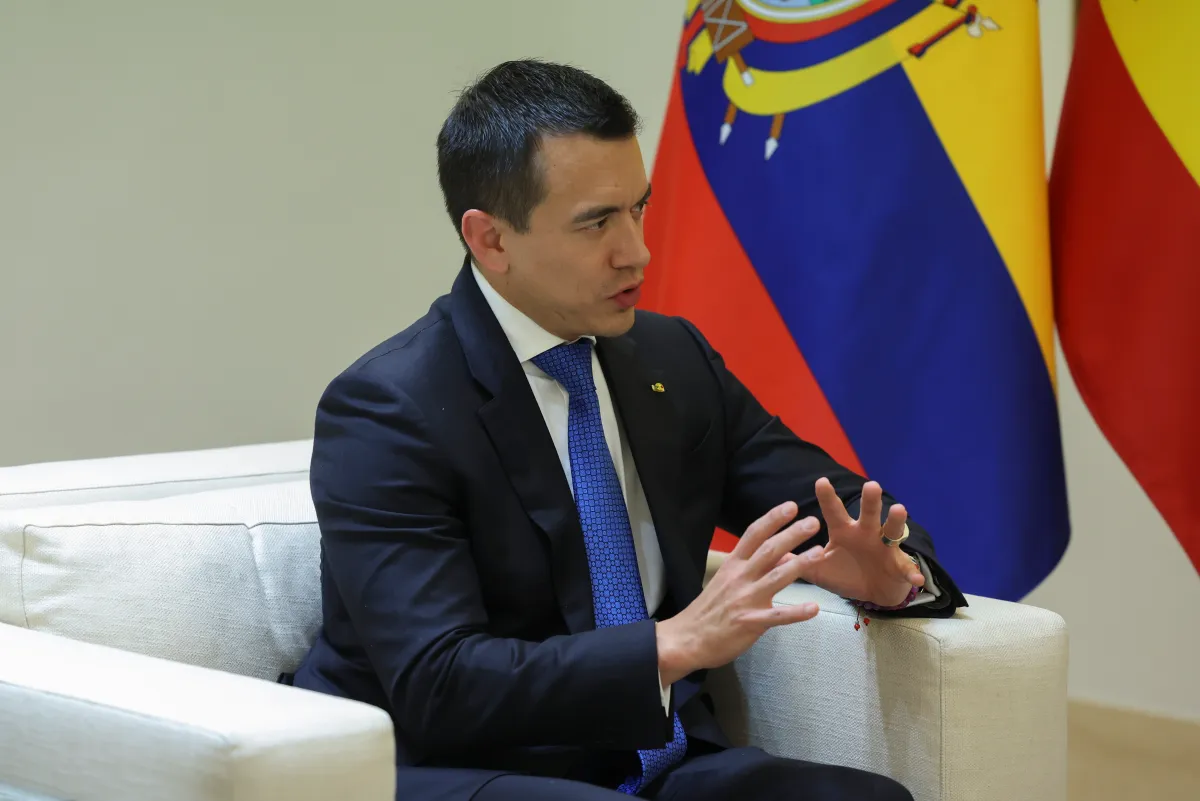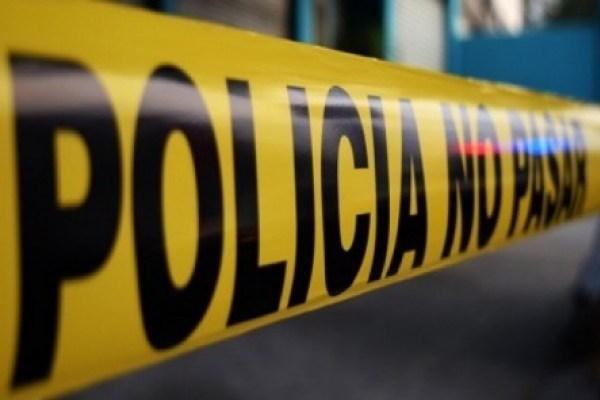International
Noboa insists on a new state of emergency in Ecuador after the previous two were invalidated

The president of Ecuador, Daniel Noboa, again decreed on Tuesday for the third time a state of emergency in part of the country’s territory, after the previous two declarations were revoked by the Constitutional Court, considering that the measure was not sufficiently argued.
This new state of emergency for 60 days covers six provinces (Guayas, Los Ríos, Manabí, Orellana, Santa Elena and El Oro) and the municipality of Camilo Ponce Enríquez, a mining enclave in the southern Andean province of Azuay where the mayor was murdered in April and this week eight bodies with signs of torture were found in a mining concession.
In these territories the measure contemplates the suspension of the rights of inviolability of the domicile, inviolability of correspondence and freedom of assembly, according to the decree, which extends for more than 50 pages to support this declaration.
It also implies the mobilization of the Armed Forces and the National Police to carry out operations against organized crime gangs, to which Noboa has declared “war” since the beginning of the year by raising the fight against them to “internal armed conflict,” with which he has come to classify them as terrorist groups and non-state belligerent actors.
The Presidency of Ecuador stressed in a statement that on this occasion the decree of the state of emergency “has the support of the World Association of Jurists (WJA, for its acronym in English),” in view of the analysis of the legality of the measure that must be carried out again by the Constitutional Court.
On this occasion, the decree of the state of emergency establishes that the Constitutional Court may have access to secret reports from the Government authorities in case they need to review them to evaluate the relevance of the measure, without this implying the declassification and public access of them.
The Constitutional Court validated the first state of emergency decreed by Noboa at the beginning of the year and that was in force for 90 days throughout the country, broadcast as a result of a spiral of violence by criminal gangs that included simultaneous riots in several prisons in the country with about 200 hostages and the taking of the TC Television channel by a group of armed men during a live broadcast.
Subsequently, Noboa issued two focused states of emergency that covered several provinces, but in both cases the constitutunal court considered that “the facts mentioned in the decree do not specifically constitute the cause of internal armed conflict.”
The magistrates stressed that, for the most recent decree, the argument of the internal armed conflict “was the only (reason) invoked by the President of the Republic.”
“It should be remembered that, due to its important legal implications, both the reiterated jurisprudence of this Court and international law, have established that in order to configure the cause of internal armed conflict, two parameters must be considered that address the seriousness of the situation of violence,” the Court said.
Between those two parameters cited by the court is “the level of organization of the armed group and the intensity of hostilities.”
“However, in the decree and in the reports that support it, no indications related to these parameters are mentioned,” he concluded.
However, the Court clarified that “the finding that the declaration of a state of emergency does not meet the requirements provided for in the Constitution does not imply a lack of knowledge of the serious acts of violence and the complex circumstances that the country is going through.”
He also recalled that his decision does not affect the powers provided for in the ordinary legal system for the Executive to use the Armed Forces to fulfill its constitutional mission, since the Ecuadorians approved by a large majority in a referendum held in April that the military support the Police in operations against organized crime without the need to issue states of emergency.
Organized crime gangs, mainly dedicated to drug trafficking, are credited with the wave of violence that plagues Ecuador and that has led it to be the first country in Latin America in homicides per capita, with a rate of about 47.2 per 100,000 inhabitants in 2023, according to the Ecuadorian Observatory of Organized Crime (OECO).
International
Football Fan Killed in Clashes After Colombian League Match

Fans of Cúcuta Deportivo and their traditional rivals Atlético Bucaramanga clashed outside the stadium following their local league match on Tuesday, leaving one supporter dead and several others injured.
The deceased fan was stabbed, according to a senior police official in Cúcuta who confirmed the cause of death in a video statement. Local media reported that the victim was a supporter of the visiting team, Atlético Bucaramanga.
The match ended in a 2-2 draw. Authorities had banned the entry of Atlético Bucaramanga’s organized supporters into the stadium in an effort to prevent disturbances.
Despite the restrictions, violence broke out in the surrounding areas after the game. Among the injured were three police officers, an institutional source told AFP.
The incident adds to a series of recent violent episodes linked to Colombian football. The most recent occurred in December, when supporters of Atlético Nacional and Independiente Medellín clashed in the stands and on the pitch, leaving 59 people injured.
International
Missing Spanish Sailor Rescued After 11 Days Adrift in Mediterranean

The man had departed from the port of Gandía, on Spain’s eastern coast, with the intention of reaching the southern Spanish town of Guardamar del Segura, a journey of about 150 kilometers, a spokesperson for Spain’s maritime rescue service told AFP.
Search boats and aircraft were deployed on January 17, but the operation was called off on January 22 after efforts proved unsuccessful. Alerts were then issued to vessels navigating the area in case they spotted any signs of the missing sailor.
As hopes were fading, a surveillance aircraft from the European Union’s border agency Frontex spotted the sailboat on Tuesday, along with a person signaling for help, approximately 53 nautical miles northeast of Bejaia, Algeria.
A nearby vessel, the Singapore-flagged bulk carrier Thor Confidence, carried out the rescue and is expected to bring the man to an end to his ordeal when it arrives on Thursday in the southern Spanish port city of Algeciras.
Maritime rescue services shared images on social media showing a small white sailboat drifting at sea and secured alongside the much larger ship.
It remains unclear how the sailboat ended up hundreds of kilometers off its intended route or how the man managed to survive for so long alone in open waters.
International
Rubio Says U.S. Could Participate in Follow-Up Russia-Ukraine Talks

The United States could join a new round of talks this week aimed at ending Russia’s invasion of Ukraine, Secretary of State Marco Rubio said on Tuesday.
Teams from Kyiv and Moscow met last Friday and Saturday in Abu Dhabi in their first publicly acknowledged direct negotiations to discuss the peace initiative promoted by former U.S. President Donald Trump.
“They are going to hold follow-up talks again this week,” Rubio told the Senate Foreign Relations Committee. “There could be U.S. participation.”
However, Rubio suggested that Washington’s role may be more limited than during last week’s discussions, which included Steve Witkoff, the president’s special envoy, and Jared Kushner, Trump’s son-in-law.
The secretary of state indicated that progress may have already been made on security guarantees for Ukraine, one of Kyiv’s key demands in any agreement with Moscow after nearly four years of Russian invasion.
“There is one remaining issue that everyone is familiar with, and that is the territorial claim over Donetsk,” Rubio said, referring to the eastern Ukrainian region that Russia wants Ukraine to cede.
“I know that active efforts are underway to see whether the positions of both sides on this issue can be reconciled. It remains a bridge we have not yet crossed,” he added during the hearing.
Rubio acknowledged that the territorial question would be particularly difficult for Ukraine to resolve.
-

 Central America3 days ago
Central America3 days agoGuatemala seizes over a ton of cocaine hidden in flour at Pacific port
-

 International4 days ago
International4 days agoDelcy Rodríguez seeks political agreements after Maduro’s ouster
-

 International3 days ago
International3 days agoHistoric snowstorm paralyzes Toronto after 60 centimeters of snow
-

 International3 days ago
International3 days agoSpain’s irregular migrant population rises to 840,000, study finds
-

 Central America2 days ago
Central America2 days agoGuatemala Police Arrest Prison Guard Caught in the Act of Extortion
-

 International4 days ago
International4 days agoFederal immigration agents kill man in Minneapolis, sparking protests and outrage
-

 Central America2 days ago
Central America2 days agoHonduras swears in conservative president Asfura after disputed election
-

 Central America2 days ago
Central America2 days agoBukele leads public trust rankings as UCA survey highlights gains in security
-

 International19 hours ago
International19 hours agoFootball Fan Killed in Clashes After Colombian League Match
-

 International2 days ago
International2 days agoWinter Storm Fern Leaves 30 Dead and Over One Million Without Power Across the U.S.
-

 International2 days ago
International2 days agoDoomsday clock moves to 85 seconds before midnight amid rising global risks
-

 Sin categoría2 days ago
Sin categoría2 days agoEight Killed in Series of Armed Attacks in Ecuador’s Manabí Province
-

 International3 days ago
International3 days agoRights group says nearly 6,000 killed in Iran protest crackdown
-

 International2 days ago
International2 days agoSpain approves plan to regularize up to 500,000 migrants in Historic Shift
-

 International19 hours ago
International19 hours agoRubio Says U.S. Could Participate in Follow-Up Russia-Ukraine Talks
-

 International3 days ago
International3 days agoVenezuela frees at least 80 political prisoners, NGO says
-

 Sin categoría2 days ago
Sin categoría2 days agoEl Salvador Launches Fourth Year of Ocean Mission to Protect Marine Ecosystems
-

 International19 hours ago
International19 hours agoMissing Spanish Sailor Rescued After 11 Days Adrift in Mediterranean
-

 International3 days ago
International3 days agoEU launches new probe into X over AI-generated fake nude images
-

 Central America19 hours ago
Central America19 hours agoGuatemala President Says Starlink Terminal Found Inside Prison
-

 International3 days ago
International3 days agoFrance debates ban on social media for children under 15
-

 International3 days ago
International3 days agoSevere winter storm grips U.S., leaves multiple dead as extreme cold persists


























